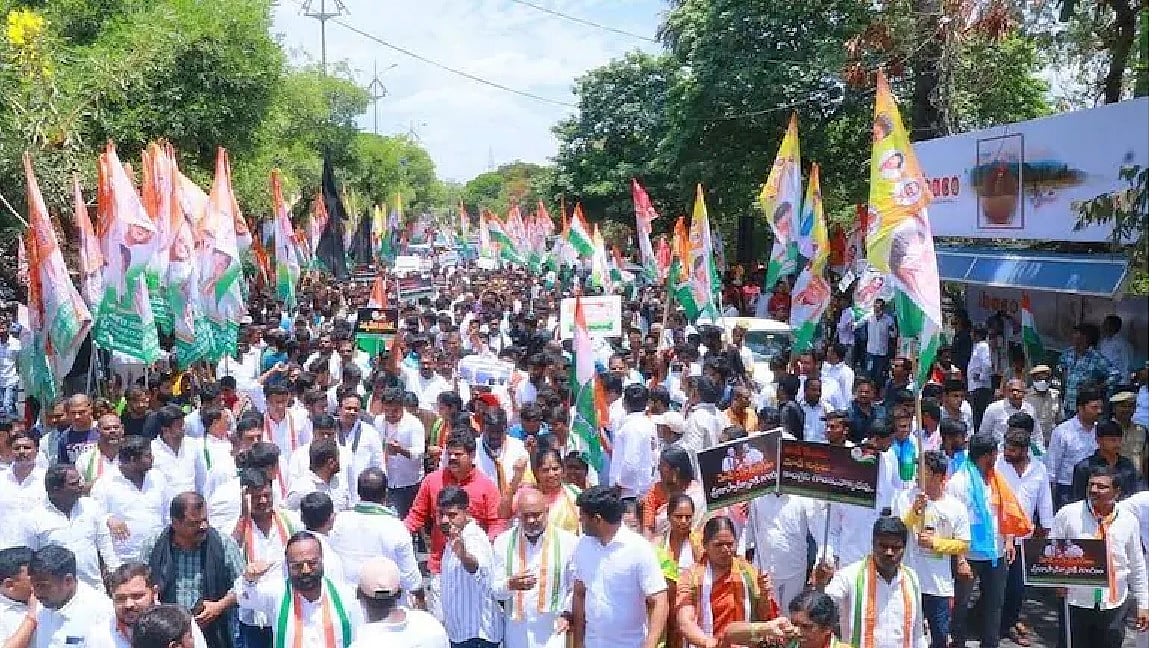Mobilising protests on matters of public interest is the business of a political party. The Congress needs to assess whether holding nation-wide demonstrations, all because a regulatory agency has summoned its ex-president, is a politically productive strategy. Particularly in view of the long-standing criticism that it behaves less like a political party than the private fiefdom of the Nehru-Gandhis.
Certainly, the principle of presumptive innocence applies to Rahul Gandhi in the National Herald case. Many people may also buy into the Congress contention that the Enforcement Directorate (ED) is highly politicised and is acting as an instrument of the ruling dispensation. They may even see the Gandhi scion as a victim of vendetta politics.
In this scenario, it is for the judiciary to step in and safeguard Mr Gandhi’s rights. He is free to approach the courts, and should the ED violate constitutional provisions, they will extend protection. Indeed, the Supreme Court granted the Gandhis relief from personal appearance in a trial court in 2016, while making it clear that no one was above the law.
Even if Mr Gandhi is being subjected to undue harassment by the ED, politics demands sacrifice and courage of conviction. Sharad Pawar, in response to an ED notice, chose to play on the front foot – he volunteered to appear before the federal agency in 2019, even though he had not been issued a summons! By picketing the ED office, the Congress may inadvertently be sending the wrong signals: a lack of faith in the judiciary, or an attempt to make political capital.
Mr Gandhi is not the first Congress leader to receive a summons from a regulatory agency. In 2019, former Finance Minister P Chidambaram appeared before the ED in connection with a money laundering investigation. His son and Member of Parliament Karti Chidambaram presented himself before the CBI last month. Former Haryana chief minister Bhupinder Singh Hooda has also appeared before regulatory agencies. None of these instances were marked by public demonstrations.
Should Rajasthan CM Ashok Gehlot be spending his time defending the Gandhis in Delhi, or attending to the quota stir that has led to blocking of an arterial highway and disrupted normal life in his state? Likewise, Chhattisgarh CM Bhupesh Baghel joined the protests and was detained by the Delhi police earlier this week.
The impression is that protecting the Gandhis has been prioritised above all else. While this kind of public spectacle may be expected of a one-horse (personality-driven) regional outfit, the Congress should be conscious of the fact that it is the principal Opposition party.
At a time when the Congress should have been forging Opposition unity ahead of the Presidential elections next month, that role has now been assumed by NCP leader Sharad Pawar and West Bengal CM Mamata Banerjee. Granted, the current Rajya Sabha standings indicate the NDA nominee for President of India will sail through, with the support of the YSR Congress. Even so, the Congress should be taking a more active part in putting up a strong candidate.
Nor did the Congress endear itself to the Opposition in the Rajya Sabha elections. According to the JD(S), if the Congress had acceded to its request and asked its MLAs to give their second preference vote to the JD(S) candidate, the BJP may well have failed to win a third seat in Karnataka. Instead, the Congress fielded a second candidate, with the result that the BJP’s Lehar Singh Siroya sailed through.
The Congress has not elicited sympathy across the board. While its allies have tweeted in support of Mr Gandhi, the Trinamool Congress (TMC) mouthpiece Jago Bangla observed that the multi-city protests by Congress workers at ED offices were an example of political opportunism.
Small wonder the Congress is being increasingly attenuated. Former HRD minister Kapil Sibal is the latest high-profile leader to have quit. He has now been elected to the Rajya Sabha, courtesy of the Samajwadi Party. Others are waiting in the wings, for an ideologically compatible alternative to emerge. Still others are optimistic that Priyanka Vadra, despite the electoral debacle in Uttar Pradesh, can emerge as a credible leader.
The Congress can still boast of mass leaders, like Gehlot and Baghel, who can win elections on their own, although they are outnumbered by those who survive on largesse from the Gandhis. All of them have rallied to Mr Gandhi’s cause as a matter of political survival. This became clear in the Rajya Sabha elections, when loyalists were given preference over experienced parliamentarians.
Members of the G23 – the ginger group which faced a major backlash over their proposals for organisational changes - are not convinced that the show of strength over the ED summons will elicit public sympathy for the party. Quite the reverse. The Congress would do better to direct its energies towards public causes and finding ways to capture the imagination of electorates.
(The writer is a senior journalist with 35 years of experience working withmajornewspapers and magazines. She is now an independent writer and author. She tweets at @BhavKang)










